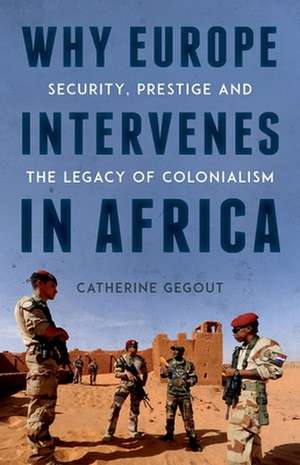Why Europe Intervenes in Africa
Autor Catherine Gegouten Limba Engleză Hardback
European Union. When conflict occurs in Africa, the response of European actors is generally inaction. This can be explained in several ways: the absence of strategic and economic interests, the unwillingness of European leaders to become involved in conflicts in former colonies of other European states, and
sometimes the Eurocentric assumption that conflict in Africa is a normal event which does not require intervention. When European actors do decide to intervene, it is primarily for motives of security and prestige, and not primarily for economic or humanitarian reasons. The weight of past relations
with Africa can also be a driver for European military intervention, but the impact of that past is changing. This book offers a theory of European intervention based mainly on realist and post-colonial approaches. It refutes the assumptions of liberals and constructivists who posit that states and organisations intervene primarily in order to respect the principle of the 'responsibility to protect'.
| Toate formatele și edițiile | Preț | Express |
|---|---|---|
| Paperback (1) | 122.04 lei 3-5 săpt. | +39.85 lei 7-13 zile |
| C Hurst & Co Publishers Ltd – 3 feb 2022 | 122.04 lei 3-5 săpt. | +39.85 lei 7-13 zile |
| Hardback (1) | 369.30 lei 3-5 săpt. | |
| – | 369.30 lei 3-5 săpt. |
Preț: 369.30 lei
Nou
70.67€ • 77.00$ • 59.55£
Carte disponibilă
Livrare economică 02-16 aprilie
Specificații
ISBN-10: 0190845163
Pagini: 320
Dimensiuni: 137 x 221 x 33 mm
Greutate: 0.57 kg
Notă biografică
Catherine Gegout is Associate Professor in International Relations at the University of Nottingham. She was Principal Investigator for the British Academy Co-Reach project on Europe and China: Addressing New International Security and Development Challenges in Africa. Her first book was European Foreign and Security Policy: States, Power, Institutions.
Descriere
Why Europe Intervenes in Africa analyses the underlying causes of all European decisions for and against military interventions in conflicts in African states since the late 1980s. It focuses on the main European actors who have deployed troops in Africa: France, the United Kingdom and the European Union. When conflict occurs in Africa, the response of European actors is generally inaction.
This can be explained in several ways: the absence of strategic and economic interests, the unwillingness of European leaders to become involved in conflicts in former colonies of other European states, and sometimes the Eurocentric assumption that conflict in Africa is a normal event which does not require intervention. When European actors do decide to intervene, it is primarily for motives of security and prestige, and not primarily for economic or humanitarian reasons. The weight of past relations with Africa can also be a driver for European military intervention, but the impact of that past is changing.
This book offers a theory of European intervention based mainly on realist and post-colonial approaches. It refutes the assumptions of liberals and constructivists who posit that states and organisations intervene primarily in order to respect the principle of the 'responsibility to protect'.
